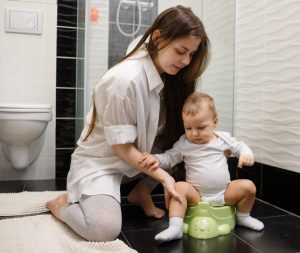Elimination Communication

I remember when my daughter was a few months old, and a friend asked me if there were anything I said I would not do that I do now. For example, did I now use screen time when I had planned not to? I was somewhat put off by the question; not that it is wrong to change your mind on parenting decisions, but I perceived it as somewhat defeatist to focus on what goal I had fallen short of. I could not think of any parenting plan I had changed at the time. However, I would have a different answer today – but with a positive spin! Before my daughter was born, I had heard of elimination communication (EC) but quickly wrote it off as not for us. Then 10 months ago it became something I do with my daughter, and I wish we had started sooner! I would love to share with you what elimination communication is, its purpose, and some basic information on getting started.
You may not have heard of elimination communication. EC is a practice where a parent assists a baby in using the toilet instead of relying solely on diapers. This often begins at birth or sometime before conventional potty training. It’s important to note that EC is not the same as potty training. It doesn’t aim to teach potty independence, but rather, it relies on the parent or caregiver to be in tune with the baby and recognize their cues, thereby treating the diaper as a backup rather than a full-time toilet.

Elimination communication may seem foreign to modern Americans, who have come to rely on diapers. However, EC was the norm before disposable diapers, and it is still the norm in different parts of the world. In some times and places, EC is practiced out of necessity, but there are more benefits to it than that. Have you ever had a situation where your baby is crying, and to figure out what is wrong, you go to change the diaper, and then when you take the diaper off, your baby pees? Babies are born incredibly smart and, from birth, signal their needs to us. It is a big responsibility for us as parents to understand them! Elimination communication helps parents to understand their baby’s signs and signals, giving the baby dignity, cleanliness, and a unique connection with their parent. Additionally, it can lead to babies that are potty trained and out of diapers sooner (saving you money).
 When my daughter was around 7 months old, I became more aware whenever she was relieving herself. It seemed silly to know what was happening and yet wait to change her diaper. Why not create a connection between eliminating in the bathroom, instead of continuing to train her to go in her diaper? This was when elimination communication crossed my mind again, but I put it off for a while, unsure of how to begin, convinced it would be too difficult. After hearing someone else share about their success with EC on Instagram, I finally got the courage to start around 10 months ago. I regret not starting sooner!
When my daughter was around 7 months old, I became more aware whenever she was relieving herself. It seemed silly to know what was happening and yet wait to change her diaper. Why not create a connection between eliminating in the bathroom, instead of continuing to train her to go in her diaper? This was when elimination communication crossed my mind again, but I put it off for a while, unsure of how to begin, convinced it would be too difficult. After hearing someone else share about their success with EC on Instagram, I finally got the courage to start around 10 months ago. I regret not starting sooner!
Here are the basics: it is recommended that you start with diaper-free observation time to learn how often your baby goes to the bathroom after waking and after eating and if they have any signals before they go, such as fussiness or stillness, having their diaper, etc. There are also 4 “easy catches:” offering the potty at every diaper change, when they wake up, when they poop, and after taking them out of a container such as a high chair, car seat, etc. This is a very simple overview, but it is not too difficult or takes a little time and effort.
It can feel overwhelming to start, but plenty of free information is available. I recommend following @godiaperfree on Instagram if you want to try out EC. She provides free information on her social media, has a podcast, and sells courses and books. It is also helpful to note that if it does not have to be all or nothing- you can practice EC part-time as it works for you and your family. Whether it is elimination communication or something else, you may surprise yourself with what you are capable of as a parent!
Find more EC information at: